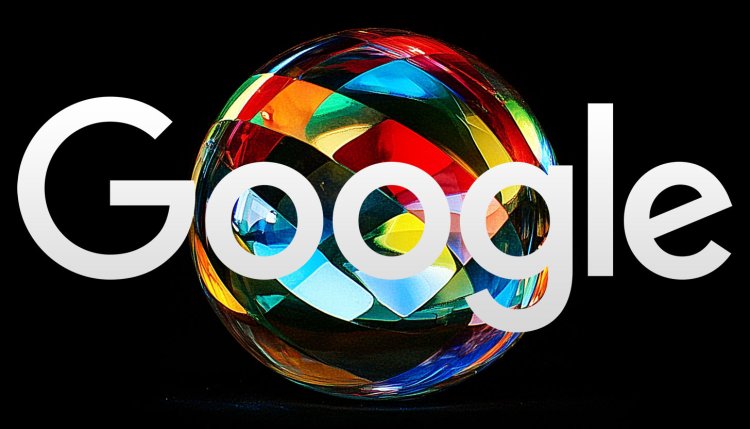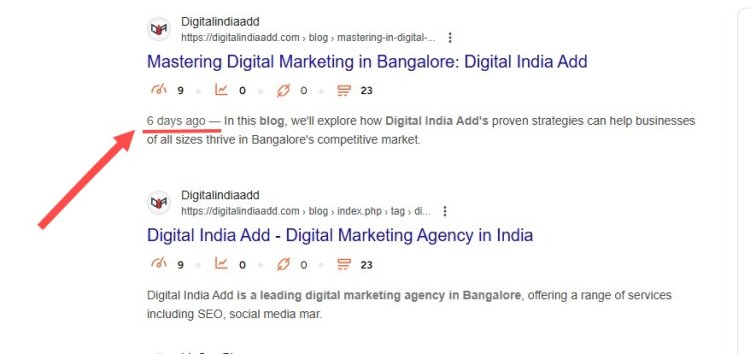Google Search Snippet Showing Future Date: Is It a Bug or a New Feature? | Digital India Add
Explore the recent trend of Google Search snippets displaying future dates and its implications for SEO strategies. Is it a bug or a feature? Get expert analysis and tips on optimizing your content for future-based search results, structured data, and more from Digital India Add.

In today's fast-evolving digital world, we frequently witness remarkable advancements in technology and search engine functionalities. One of the latest phenomena that have captured the attention of digital enthusiasts is the appearance of Google search snippets displaying future dates. For those unfamiliar, Google search snippets are the brief summaries of information shown at the top of search results, designed to provide users with the most relevant information instantly. However, a recent trend has emerged where these snippets, instead of showing current dates or time-sensitive data, display future dates that have left many scratching their heads.
Is this behavior a bug or a revolutionary new feature? As an essential player in the digital landscape, Digital India Add aims to delve into this intriguing question, exploring the reasons behind this anomaly, its potential implications, and what it means for search engine optimization (SEO) and user experience in the future.
What Are Google Search Snippets?
Before diving into the mystery of the future dates, let’s understand what Google search snippets are and why they matter. A search snippet is the information box that appears at the top of the search engine results pages (SERPs) when you search for a specific query. These snippets are designed to provide quick answers to users’ queries without needing them to click on a website link.
For instance, if you search for "today’s weather," Google might show a snippet with the current weather conditions. This feature has become increasingly useful, saving users time by delivering direct answers without navigating away from the search page.
The Emergence of Future Dates in Google Snippets
Recently, digital marketers and regular users alike have noticed something strange: certain search snippets are now showing future dates, when we would expect them to display the current date or time-relevant details.

Imagine searching for an event or appointment scheduled for a specific day, only to see a snippet displaying the date weeks or even months in advance. This anomaly has led many to wonder whether this is a bug in Google’s algorithm or a deliberate shift in how search results are presented.
Is It a Bug or a Feature?
At Digital India Add, we believe that this unexpected behavior is likely not a bug, but rather an evolving feature in Google’s search engine optimization strategy. There are several plausible reasons why Google might be experimenting with this.
· Enhanced User Experience
One of the core philosophies of Google is to improve user experience, and showing future dates could be a strategic decision to enhance how people interact with search results. By displaying future dates, Google can help users prepare for upcoming events, deadlines, or other time-specific queries, offering more proactive solutions.
For instance, if you’re looking for movie release dates, Google might show the release date of a film scheduled for next month rather than the current date. This could be seen as Google’s way of giving users a comprehensive snapshot of what’s ahead, keeping them better informed.
· Anticipating Queries in Advance
Google is constantly refining its search algorithms to predict what users are likely to look for next. If a user frequently searches for time-sensitive information, Google may anticipate that they are looking for upcoming events or activities. Therefore, showing future dates in snippets might be a way of helping Google predict future queries and deliver more accurate results ahead of time.
This could be especially useful for industries like travel, entertainment, or technology, where schedules and releases are often planned well in advance. It aligns with Google’s goal of becoming a proactive tool that anticipates user needs.
· Aligning With Structured Data
Google has long relied on structured data, such as schema markup, to understand the context of web content better. Websites that implement structured data with clear time-related details (like event dates or publication schedules) might contribute to the display of future dates in snippets. By extracting information from structured data, Google can present information based on future timelines, ensuring users receive the most relevant results.
This shift could encourage businesses to optimize their websites using structured data and schema markup, making it even more crucial for marketers and webmasters to prioritize SEO best practices.
· Boosting Search Visibility for Future-Related Queries
Another reason behind showing future dates could be tied to SEO. When users search for information about future events or timelines, Google wants to ensure they are providing accurate and reliable information that is relevant in the context of the user’s search intent.
By displaying future dates in the snippet, Google may improve the visibility of upcoming events, product launches, or other time-specific queries. This aligns with Google's goal of delivering highly relevant search results to users, enhancing its reputation as a go-to search engine for both present and future needs.
Potential Impact on SEO
As Google continuously refines its search algorithms, the way search snippets display future dates could have a significant impact on SEO strategies moving forward. Here are some potential changes we might see in the SEO landscape as a result:
· Increased Focus on Event-Driven SEO
If Google continues to prioritize the display of future dates in search snippets, businesses, marketers, and webmasters will need to pay more attention to time-sensitive content. SEO strategies will need to adapt by focusing more on optimizing for events, product releases, and upcoming promotions.
Using structured data to mark important future events with specific dates will become crucial for ensuring that your content is properly indexed and displayed in future-based search snippets.
· Content Optimization for Long-Term Relevance
To take full advantage of this feature, content creators will need to develop evergreen content that not only addresses current trends but also remains relevant for the long term. Optimizing content around long-term goals and future events could help improve organic search rankings, making your content more likely to appear in snippets with future dates.
· Rise of Predictive Search Optimization
As Google refines its ability to predict users' future search queries, predictive SEO will gain prominence. Marketers will need to optimize for future intent and optimize content for long-tail keywords that focus on upcoming trends, product launches, or events.
How Digital India Add Can Help You Navigate This Change
At Digital India Add, we understand how important it is to stay ahead of digital trends. If you’re a business looking to navigate the changing landscape of search engine algorithms and snippets, we offer expert insights and strategies tailored to your needs. From structured data implementation to content optimization for future queries, our team can help you adapt to these new search behaviors, ensuring your website remains visible and relevant in Google’s evolving ecosystem.
Conclusion
Google’s search snippets displaying future dates could be a significant step towards enhancing user experience, aligning with structured data, and improving search result visibility. While some may view this as an anomaly or bug, it seems more likely to be an intentional shift designed to deliver more relevant, proactive results to users.
As this feature continues to evolve, businesses and content creators should stay informed about how these changes impact SEO and explore strategies to ensure their content remains visible and valuable in future search queries. Digital India Add is here to help you make the most of these changes, ensuring your website continues to rank and attract traffic as Google refines its search algorithms and features.
What's Your Reaction?
















